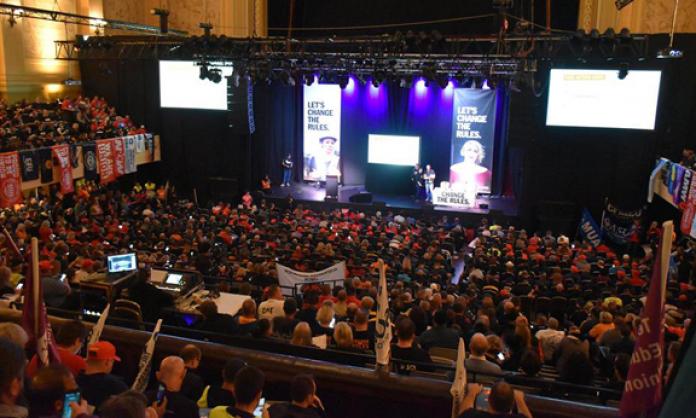More than 1,600 unionists crammed into Melbourne’s Town Hall on 17 April for an all-union delegates meeting to launch the next phase of the Change the Rules campaign, which will involve street demonstrations around the country in coming weeks.
Two hundred delegates couldn’t squeeze into the meeting, which spilled out into Swanston Street.
Delegates heard from Troy Carter, AMWU delegate from Longford, Victoria, about the epic strike of maintenance workers from Esso’s Bass Strait gas platforms – 300 days on strike, and counting, resisting a wage cut of more than 30 percent and the destruction of liveable rostering arrangements.
Troy emphasised the personal toll of the long dispute, illustrating how, from the workers’ viewpoint, the industrial rules are broken.
ACTU secretary Sally McManus took delegates through the demands of the campaign. These include ending the use of sham agreements, preventing employers from terminating enterprise agreements and boosting the legal minimums in industry awards, which are increasingly threadbare.
Perhaps the loudest applause of the day – along with the response to Troy Carter – came when McManus mentioned the need to “strengthen our right to bargain and to withdraw our labour”.
The elephant in the room, however, was the role of the Labor Party.
Many of the rules that need to be changed, especially those related to the right to strike, are creations of the ALP.
A number date to the early 1990s, when Labor dismantled Australia’s relatively centralised industrial relations system to introduce enterprise bargaining.
Labor legislation from that era includes clauses allowing industrial tribunals such as Fair Work to ban industrial action if it will cause “economic damage”, a requirement to give three days’ notice of industrial action and a tortuous path to legally protected action, which is open only once every few years, when an enterprise agreement expires.
Our movement can’t afford to give Labor a blank cheque if we’re to avoid the fate of the union campaign against John Howard’s vicious anti-worker WorkChoices laws. In that case, the campaign tipped Howard out of office (and cost him his seat). But it was wound up and failed to win substantial changes to the industrial laws from the incoming Labor government.
The meeting finished with a unanimous vote to build the mass rally in Melbourne on Wednesday, 9 May. Delegates were instructed to hold meetings in every workplace – to talk through the changes needed in each workplace or industry and to maximise attendance at the upcoming demonstrations.
This presents delegates with an important opportunity: to revive traditions of holding regular workplace meetings on the vital issues confronting workers, and to rebuild a fighting tradition that looks to workers’ strength, rather than relying on politicians, to win important gains.











